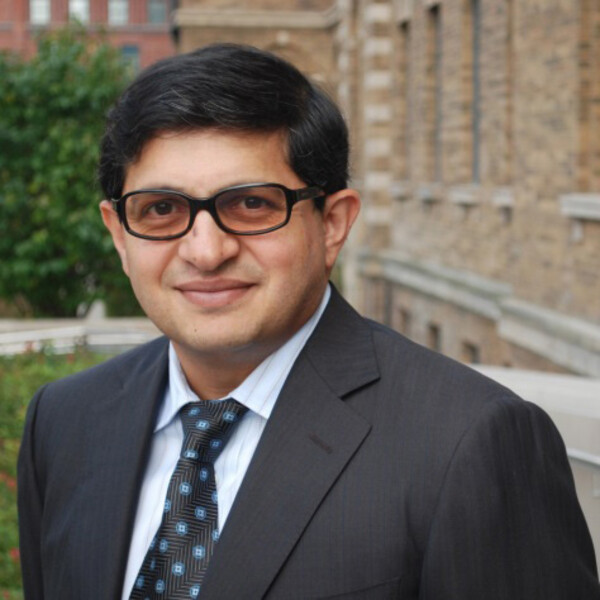Mansoor Husain
MD

Research Synopsis
Research Divisions: Cardiovascular Platform
Research Interests:
1. Molecular regulation of vascular muscle cell proliferation and differentiation.
2. Tissue-specific transgene regulation informs molecular pathophysiology.
3. Genetic and experimental models of cardiovascular disease.
4. Diabetes and cardiovascular disease: role of incretins.
5. Clinical and experimental cardiovascular imaging.
6. Acute cardiac care.
Keywords: Atherosclerosis, Cell Calcium, Cell Cycle & Proliferation, Diabetes, Heart Failure, Hypertension, Molecular Biology, Myocardial Infarction, Smooth Muscle Cell, Transcriptional Regulation, Transgenic Mice, Vascular Biology
Detailed Description:
We are focused on elucidating the molecular bases of cardiovascular diseases such as hypertension, atherosclerosis and heart failure, with a particular emphasis on identifying therapeutic targets involved in pathophysiology and a mechanism underlying the cardiovascular complications of diabetes. Our approaches encompass both cell culture-based experimental systems and tissue-specific transgenic mouse models of human cardiovascular disease. More specifically, we study the transcriptional and post-translational regulation of cell cycle- and Ca2+-regulatory genes in vascular smooth muscle cells, and the impact of molecular genetic manipulations of these pathways on both the proliferative and contractile phenotypes of vascular smooth muscle cells. We are also interested in defining the roles played by certain vasoactive hormones, enzymes and their downstream signaling pathways in inflammatory disease of the heart and circulatory system. More recently, we have begun to characterize and optimize an in vitro system for the differentiation of fully functional smooth muscle cells and cardiac myocytes from embryonic stem cells, with a view to employ these cells in disease modeling and/or regenerative therapies. Finally, we are deeply engaged in understanding the biology of the incretin hormone GLP-1 and its metabolite in the cardiovascular system. We also participate in select international and national clinical trials in this field.
METHODS USED
Molecular Biology: Quantitative RTPCR (qRTPCR), laser capture micro-dissection coupled qRTPCR, chromatin immune-precipitation (ChIP), gene cloning, promoter cloning, site-directed mutagenesis (of cloned promoter regions), ELISA, northern blotting, southern blotting, western blotting, siRNA analysis , miRNA up- or down-regulation (miRNA mimic and miRNA Antagomir), signal transduction characterization.
Cell and Tissue Culture: Electroporation of primary vascular smooth muscle cells, immortalization of primary vascular smooth muscle cells (Large T Antigen; G418 drug selection), immuno-fluorescent staining and confocal imaging of cultured cells, artery cultures, cardiomyocytes, endothelial cells, smooth muscle cells, stem cell differentiation, growing MOVAS (immortalized mouse aortic smooth muscle cell line developed by Husain Lab and deposited in American Type Culture Collection), EOMA (mouse endothelioma cell line), HL-1 (mouse atrial carcinoma cell line) cells.
Cell Physiology: Immunohistochemistry, immunocytochemistry, 3H-Thymidine cell proliferation assay, BrdU-Propidium Iodide Cell Cycle analysis via flow cytometry, “scratch wound healing” cell proliferation assay, intracellular Ca2+ imaging, cell contractility, flow cytometry, flow sorting.
Animal Physiology: Isolated murine vessel preparation, mouse vessel cannulation, mouse echocardiography & doppler MR imaging, mouse blood pressure, mouse ECG, mouse telemetry, mouse invasive hemodynamics, murine pressure-volume loops, murine echocardiography, vasomotor function, perfusion myography, myogenic tone, endothelial function, platelet aggregation, perfusion chamber thrombosis studies.
Animal Models of Disease: Carotid balloon injury, carotid artery ligation, coronary artery ligation, carotid wire injury, induction of obesity in mice, induction of diabetes in mice, ischemia-reperfusion injury, bone marrow transplantation, intravital microscopy laser injury thrombosis analysis, mouse tail bleeding assay.
EQUIPMENT USED
xCELLigence apparatus (ROCHE), thermal cycler (Veriti, ABI), Langendorff apparatus (for ex vivo Ischemia-Reperfusion Injury), fluorescence microscope, intracellular Ca2+ imaging system, cryostat, nucleic acid gel electrophoresis apparatus, UV transilluminator, protein gel electrophoresis apparatus, protein transfer apparatus, dot blotting manifold, speed-vac and vacuum pump, BioSafety cabinets, CO2 cell culture incubators, bacterial culture incubators, -20C and -80C freezers, +4C fridges, microwave oven, mini vortexers, analytical balances, low speed refrigerated centrifuge, refrigerated micro-centrifuges, stirrer/hot plates, water baths, small animal anesthesia, small animal surgical suite, dissecting microscope, invasive cardiac monitoring instrumentation.
PRESENT TRAINEES
Eric Shikatani (PhD Candidate)
Wafa Altalhi (PhD Candidate)
Dorrin Zharrin-Khat (MSc Student)
Ahsan Siraj (PDF)
Mark Chandy (PDF)
PRESENT COLLABORATIONS
Within the Department of Physiology:
Steffen-Sebastian Bolz
Heyu Ni
Outside of the Department of Physiology:
Daniel Drucker Department of Medicine, University of Toronto
Jason Fish Department of Laboratory Medicine & Pathobiology, University of Toronto
Gordon Keller Molecular Genetics, University of Toronto
Peter Zandstra IMBBE, University of Toronto
Committee member/officer of national/international scientific organizations
Hypertension Canada – Board Member and Research Committee
Clinical Science – Associate Editor
